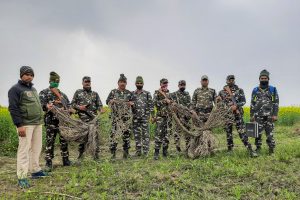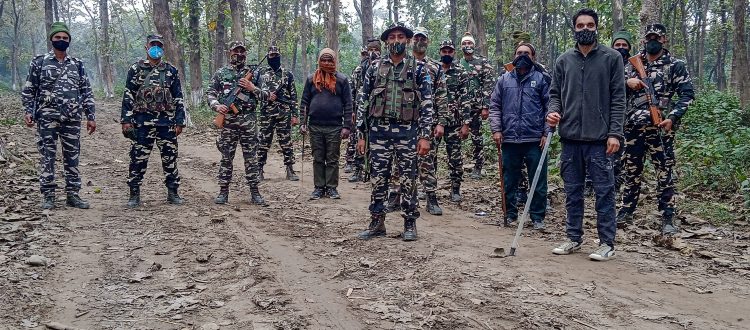Cross Borders Unite to Save the Animals from Snares
Valmiki Tiger Reserve, 10th March 2022:
The Indo-Nepal border, spanning 1751 km includes the states of Uttar Pradesh and Bihar. This is a highly sensitive area that has porous borders encouraging cross-boundary wildlife crimes such as poaching, illegal wildlife trade and trafficking. Wildlife Trust of India(WTI) has been working in this landscape for the past decade towards mitigation of human-wildlife conflict, wildlife crime prevention, snare combing activities, and in-situ conservation activities such as Gandak Gharial Recovery Project.
The entire landscape boasts of a variety of flora and fauna and is home to flagship species such as Tiger (Panthera tigris), Elephant (Elephas maximus), Leopard (Panthera pardus), and One-Horned Rhinoceros (Rhinoceros unicornis). However, the wildlife found in these areas is increasingly falling prey to snares which lead to an agonizing death for the trapped animal. Over the past years, WTI has confiscated different types of snares and hunting tools such as spears, leg traps, bows & arrows, huge nets, and similar devices from the forest fringes.

While State Forest Departments conduct anti-snare walks across the sensitive areas of PAs, it is very important to encourage a multi-agency effort to ensure coordinated functioning of all enforcement agencies. Illegal wildlife contraband which is periodically transported by road through these porous international borders, require the vigilance of border security such as Sashastra Seema Bal (SSB).
The series of anti-snare walks began at the turn of the year 2022, when a baffling total of 24 snares were discovered along the border. The Bihar Forest Department took cognizance of the matter and initiated immediate action. In a joint transboundary meeting held with the Nepal Forest Department, both Departments established a partnership and mutually agreed to conduct anti-snare walks along the sensitive Indo-Nepal border.

In light of the above, Bihar Forest Department especially the frontline staff at Valmiki Tiger Reserve and Nepal Forest Department, assisted by WTI, conducted a joint anti-snare walk at the international border at Manpur beat of Valmiki Tiger Reserve. The walk commenced late in the morning with an introductory session between the officials. A 6-member team from Nepal, was led by the forest ranger of Parsa National Park. From the Indian side, a 12-member team was led by the Ranger of Manguraha Forest Range, VTR, Bihar. Dr. Shiekh Marifatul Haq, Field officer, WTI, briefed the team prior to the start of the anti-snare walk on how to carry out the anti-snare walk and the benefits of carrying out such walks in collaboration with various enforcement agencies. He also briefed the team about the harmful effects of the snare on the wildlife. Following that, two teams were formed, and each was assigned a specific patrolling area. Three snares and three spears were removed from the operation.

The anti-snare walk concluded at 1:00 p.m. by the Ranger of the VTR, who expressed special gratitude to the Nepal officials for collaborating with the Forest Department of Bihar to successfully carry out the anti-snare walk along the Indo-Nepal border. Joint collaboration was emphasized with continuous patrolling to ensure the safety of wildlife. Nepalese Officials agreed that the incidents of snaring have increased on both Nepal side and India, and that such snare-combing activities help protect the wildlife inhabit the forests. The officials reassured that they will be consistent in anti-snare walks and will sensitize local communities on the repercussions of putting up snares.
A total of 8.9 km was covered during the joint anti-snare walk with the support of both the Forest Departments. This joint cooperation has been instrumental in setting a precedent for how different countries can work together for a better future for wildlife conservation in the country.
This project is supported by the Bureau of International Narcotics and Law Enforcement Affairs (INL)









